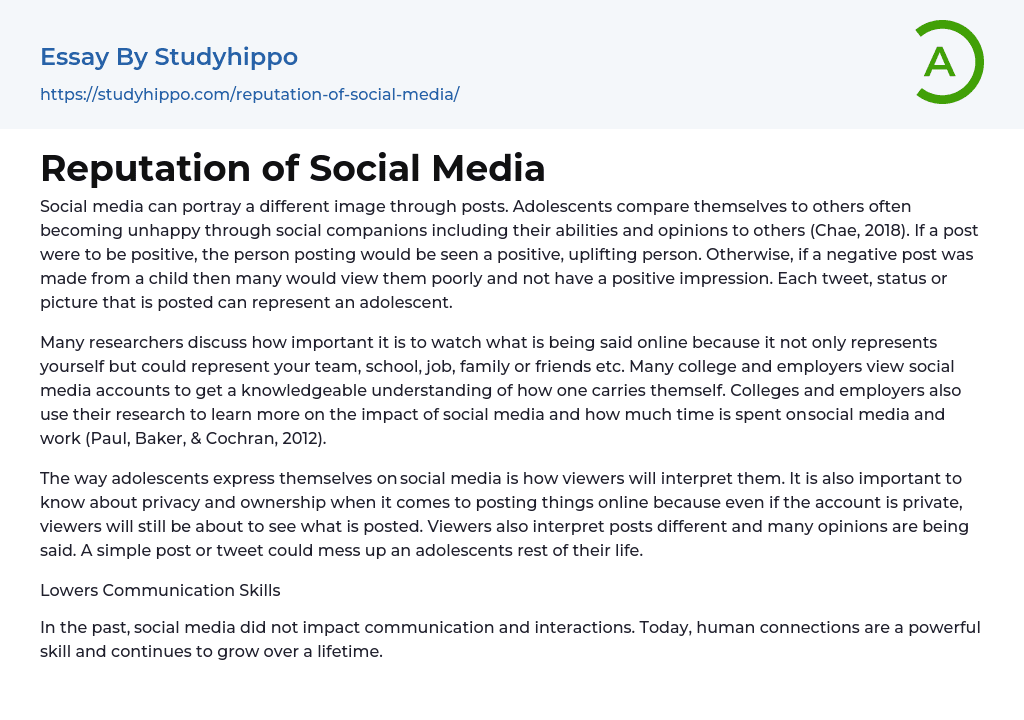Social media can present an alternate representation via posts.
Adolescents frequently compare themselves to others, often leading to unhappiness. This comparison is done through their interactions with friends and peers, including evaluating their abilities and opinions (Chae, 2018). When an adolescent posts a positive message or content, they are perceived as a positive and uplifting person. However, if they post something negative, it can result in a negative impression and be viewed poorly by others. Every tweet, status update, or picture shared by an adolescent has the potential to represent them.
There is extensive debate among researchers regarding the significance of monitoring online behavior. This monitoring not only reflects the individual but also their team, school, job, family, and friends. Numerous colleges and employers examine soci
...al media accounts to gain insight into a person's conduct. Furthermore, these institutions perform studies to comprehend the impact of social media and the time spent on it concerning work (Paul, Baker, ; Cochran, 2012). The way adolescents express themselves on social media shapes how others perceive them. Moreover, comprehending privacy and ownership is essential when sharing content online since even private accounts can still be accessed by others.
Viewers have different interpretations of posts and express various opinions. A simple post or tweet can have long-lasting negative effects on the life of an adolescent.
Social Media Lowers Communication Skills
In the past, social media did not impact communication and interactions. However, today, human connections are a valuable skill that continues to develop throughout a lifetime. Social skills are crucial in today's society, and adolescents cannot cultivate these necessary skills through social media.
Research conducte
by Hurley (2018) suggests that excessive time spent online can hinder the development of empathy and compassion in adolescents. This is because they are deprived of the ability to read body language and social cues. Dantuono (2015) further highlights that this can result in limited communication skills for future generations. Additionally, while social media promotes sharing and discussing issues, it also diminishes face-to-face interactions.
The Rise of Mental Illnesses
The anonymity provided by social media makes it easy for adolescents to engage in cyberbullying, leading to a rapid increase in such incidents (Hurley, 2018).
The impact of cyberbullying on individuals is significant, leading to low self-esteem, lack of confidence, and various negative effects. Victims often avoid sports, experience anxiety in school, and struggle with socializing. The consequences of cyberbullying are connected to depression and anxiety, which can ultimately lead to thoughts of suicide (Hurley, 2018). Moreover, children tend to place excessive importance on their self-worth based on the number of "likes" they receive on social media platforms. This can result in negative decision-making, changes in appearance, and participation in social media challenges (Dantuono, 2015; Hurley, 2018). Social networking sites like Facebook contribute to an environment where individuals frequently compare themselves to others (Hurley, 2018).
According to Kaplan and Haenlein, Facebook and Instagram are linked to depression due to the self-presentation and comparison opportunities they provide. They specifically highlight Instagram as a popular platform for sharing visual content such as photos and videos, with less emphasis on written text.
According to Pittman and Reich, self-presentation through photos and videos on Instagram is considered more realistic (as cited in Chae, 2018). However, this image-based social media platform, along with Snapchat, has been
associated with negative effects on loneliness and happiness. Negative emotions can arise from various forms of social media, but particularly from Instagram. Shirley Cramer CBE, Chief Executive of RSPH, highlighted that Instagram and Snapchat are among the platforms with the most detrimental impact on mental health and well-being.
Both platforms, according to Learning & Skills Bulletin (2017), have a strong focus on images and may be causing feelings of inadequacy and anxiety among teenagers. Yang's study, as cited by Chae (2018), suggests that Instagram only contributes to loneliness when it is used for social comparison.
- Social Media Negative Effects essays
- Effects of Social Media essays
- Collaboration essays
- Dialogue essays
- Fake News essays
- Journalism essays
- Mass Media essays
- Media Analysis essays
- Media Bias essays
- Media Studies essays
- Message essays
- News essays
- Propaganda essays
- Radio essays
- Rogerian Argument essays
- Role of Media essays
- Social Media essays
- Social Media Marketing essays
- Social Networking essays
- Youtube essays




